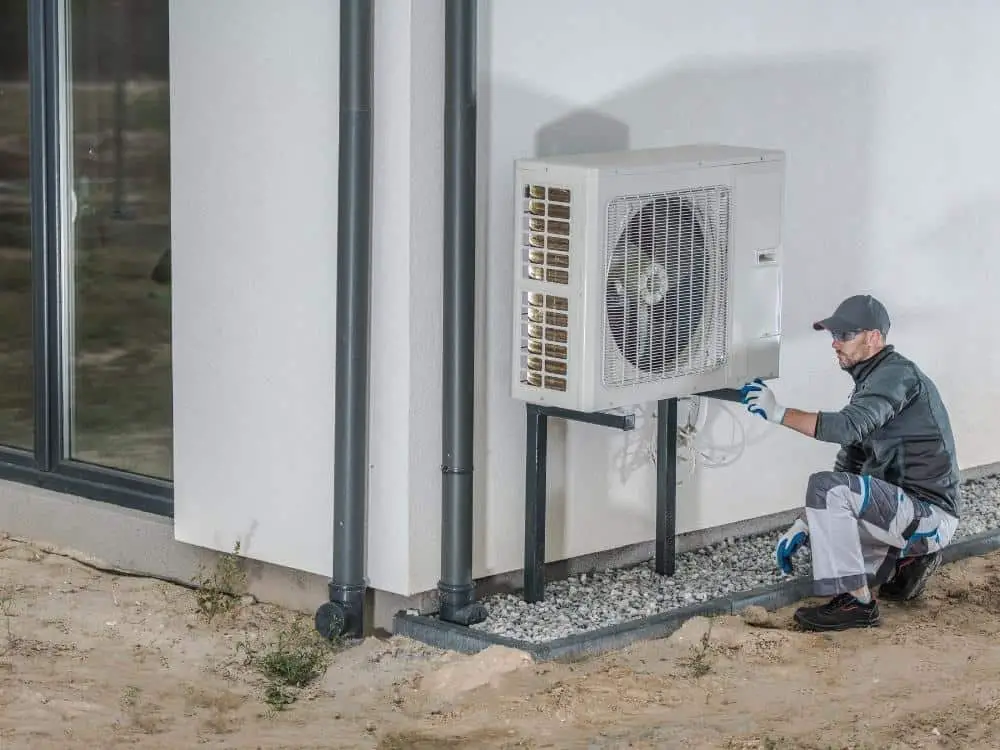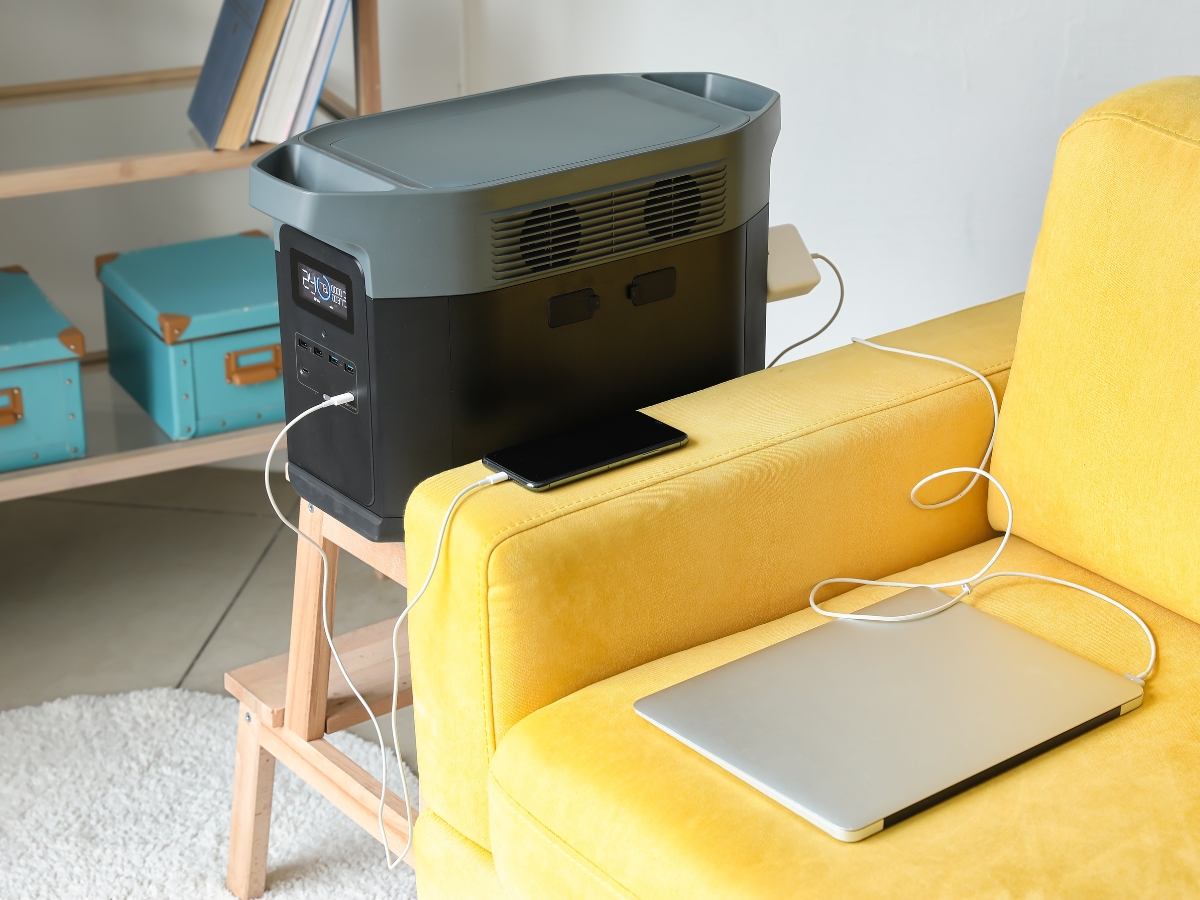Some frost buildup on your heat pump is normal, and the system is designed to run a defrost cycle automatically to negate this condition. The ambient conditions may also contribute to the heat pump freezing up, but these appliances have been designed to operate in temperature extremes.
The three main causal factors for a heat pump freezing up are:
- Insufficient airflow over the evaporator/condenser unit;
- Coldwater falling on the unit and freezing due to ambient temperature:
- Pump installation is not completely level, preventing proper draining.
It would help if you planned to have the heat pump system maintained at least once per year by a professional HVAC technician. Lack of proper maintenance will lead to the heat pump not performing as designed and costing you inconvenience and extra power costs.
Let’s look at why heat pumps freeze up and correct this condition.

How Do Heat Pumps Work?
Heat pumps are designed on the same principle as refrigerators, freezers, and air conditioners. A liquid/gas refrigerant is circulated through a closed-loop heat exchanger and condenser system. When the liquid expands to become a gas, it cools the surrounding area by absorbing the ambient heat.
The gas is then cooled and compressed back to a liquid utilizing a condenser and compressor pump. This cycle has to be controlled by the device programming to ensure that it runs efficiently.
Why Does My Heat Pump Freeze In Summer Months
During the summer months, the heat exchanger may show signs of frost, but the appliance is programmed to run regular defrost cycles to melt off the frost. You may even notice some steam rising from the heat exchanger when the defrost cycle runs.
If the frost is persistent or starts forming ice, it may signify that the defrost cycle is not running for long enough.
Blocked filters may also cause it on the air intake. Check for lint or dust clogging up the filters and clean them using a vacuum cleaner or replace them with new filters.
Check that you have sufficient airflow over the condenser and heat exchanger units and that the air intakes around the unit are not impeded.
Why Does My Heat Pump Freeze In Winter Months?
Heat pumps are prone to some icing up during the winter months or severe cold snaps, and you should not be alarmed by this. If the freezing up is persistent or envelopes the outside housing of the heat exchanger, there may be a more severe problem.
The external unit should not be installed in an area where water from the roof or gutters can fall on top of the unit and freeze due to the cold ambient conditions. The heat exchanger has a programmed defrosting cycle during which the system heats the condenser gas lines to melt off the ice.
The system is also fitted with a temperature sensor located on the condenser that will initiate the defrost cycle to run if the ice or frost buildup is excessive. The position of this sensor is critical and can influence when the defrost cycle kicks on.
Two identical heat exchangers may exhibit different levels of freezing up due to minor differences in the location of the sensors.
Defrost Cycle
The defrost cycle may also not run for a long enough time to completely defrost the system. To correct all but the most obvious issues, such as dirty filters and airflow blockages around the unit, a qualified HVAC technician must perform all other adjustments and repairs.
The electrical system troubleshooting is well documented in the heat pumps user manual but requires a qualified technician’s diagnostic and electrical skills.
The risk of electrocuting yourself by trying to do this work yourself is not worth it. You may cause more damage and increase the cost of the repair bill.
Why Do Heat Pumps Freeze Up?
Once the refrigerant gas has dissipated the excess heat flowing through the house ducting, the gas is pumped back into the liquid phase by a compressor unit. The liquefied gas flows through the external heat exchanger absorbing heat from the outside ambient air.
Even when the temperature outside is below freezing, it is still high enough to turn the liquid refrigerant into a gas that has absorbed heat and will carry it into the heating ducts in your house. The cycle is repeated with the only energy that is required is for the condenser compressor.
When the liquid refrigerant is released into the low-pressure heat exchanger, the gas absorbs heat from the ambient air. If this air has high levels of moisture, this will form frost or ice on the system’s piping. The system is programmed to run a reverse defrost cycle to melt off the frost or ice from time to time.
Short Defrost Cycle
If the defrost cycle is too short, the frost or ice will not be completely melted off and cause a buildup over time. The defrost cycle needs to be set to run for longer to rectify this condition.
A qualified HVAC technician best performs this fine-tuning as the risk of electrocution to a novice is very high. It is recommended that you have your heat pump systems and air conditioners checked and serviced annually.
Having scheduled preventative maintenance will ensure that you get the best service from your appliances possible.
It will ensure that problems are corrected before causing major problems and costly repairs.
What Are Common Issues With Heat Pumps?
The frosting up of heat pumps or air conditioners is quite normal. You will often see a puddle of water under your car where the frosting from the air conditioner system is melting off.
Heat pumps work on a similar principle as air conditioners but in reverse. They collect heat from the ambient air and transfer this heat to the interior of your house.
As heat pumps run continuously during long winters or cold spells, they are programmed to run in reverse to melt off the frost or ice forming on the heat exchanger coils.
If the defrost cycle is not set long enough, the system will ice up and need to be defrosted and have the defrost cycle set to run for longer.
References:



